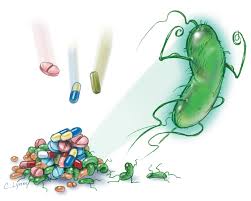
Sep 29, 2016
Blog Life Sciences Bugs are Winning: Time is Running out to Beat Antimicrobial Resistance
Antimicrobial resistance (AMR) is jeopardizing human and animal health, as well as sustainable food production and development. AMR—the resistance of bacteria, viruses, fungi, and parasites to medicines—claims the lives of roughly 700,000 people each year. A recent Review on Antimicrobial Resistance, chaired by Jim O’Neill, estimated that without effective global action, the rise of AMR could claim 10 million lives globally each year by 2050 and result in a cumulative loss in global output of USD 100 trillion. The World Bank estimates that drug-resistant infections have the potential to cause at least as much economic damage as the 2008 financial crisis.
The widespread use of antibiotics—in both humans and animals—has helped microbes evolve to become resistant to them. In recent decades, the discovery of new antibiotics has failed to keep pace with the rise of antibiotic-resistant infections. The growing threat of microbes that are resistant even to last-resort antibiotics was the topic of a United Nations (UN) General Assembly High-Level Meeting on Antimicrobial Resistance, held September 21st in New York.
At the gathering, world leaders from 193 countries signed a landmark declaration aimed at addressing the rising number of drug-resistant infections—something the World Health Organization (WHO) says has the potential to kill millions and undermine the global economy, likening it to “a slow-motion tsunami.” In a statement supporting the UN declaration, WHO Secretary-General Dr. Margaret Chan said, “Antimicrobial resistance poses a fundamental threat to human health, development, and security.”
Speaking at the meeting, UN Secretary-General Ban Ki-moon said: “It is not that it may happen in the future. It is a very present reality in all parts of the world, in developing and developed countries; in rural and urban areas; in hospitals; on farms and in communities. We are losing our ability to protect both people and animals from life-threatening infections.” The newly signed declaration recognizes the size of the problem and encourages countries to develop plans to cut back on antibiotic use, make better use of vaccines, and fund development of new drugs to combat antimicrobial resistance.
In a joint statement, countries reaffirmed their commitment to developing action plans based on the WHO Global Action Plan on Antimicrobial Resistance developed in 2015. They called for stronger systems to monitor drug-resistant infections and the volume of antimicrobials used in humans, animals, and crops, as well as increased international cooperation and funding. The countries also pledged to tighten the regulation of antimicrobial medicines, increase communication on how best to use them, and find new alternatives to such medicines, including the use of better diagnostics to match the right treatment with the right infection, and the use of vaccines to prevent infections.
The new declaration, signed during the annual UN General Assembly, followed years of warnings by global health officials about the rise of drug-resistant infections, which threaten to wipe out all effective antibiotics and antifungal medicines, leaving the world vulnerable to simple infections that once could be easily cured. Drug-resistant pathogens have flourished because of overuse and misuse of antibiotics and other antimicrobial drugs in humans, animals, and crops, as well as the spread of residues from these medicines through soil, crops, and water. Common infections such as pneumonia, gonorrhea, and postoperative infections, as well as HIV, tuberculosis, and malaria, are becoming increasingly hard to treat because of AMR.
On the eve of the UN assembly, 13 major drug companies convened and outlined four key commitments they will deliver by 2020 in an attempt to fight AMR. This new action follows the principles agreed upon in the Declaration by the Pharmaceutical, Biotechnology and Diagnostics Industries on Combating Antimicrobial Resistance, which was made in January at the 2016 World Economic Forum in Davos, Switzerland. The Declaration was signed by more than 100 companies and trade associations.
The following 13 companies signed on to the 2020 commitment: Allergan; AstraZeneca; Cipla; DSM Sinochem Pharmaceuticals; Roche; GlaxoSmithKline; Johnson & Johnson; Merck & Co., Inc.; Novartis; Pfizer; Sanofi; Shionogi & Co., Ltd.; and Wockhardt. As part of the new 2020 plan, called the Industry Roadmap for Progress on Combating Antimicrobial Resistance, the companies said they would:
As O’Neill said in a statement, “This [AMR] is a problem which it is well within our grasp to solve if we take action now.”
In today’s fast-paced biomedical world, researchers and pharmaceutical companies...

Radiopharmaceuticals represent a cutting-edge frontier in modern medicine, offer...

Implantable Remote Patient Monitoring (IRPM) devices are revolutionizing healthc...

We are your trusted research partner, providing actionable insights and custom consulting across life sciences, advanced materials, and technology. Allow BCC Research to nurture your smartest business decisions today, tomorrow, and beyond.
Contact UsBCC Research provides objective, unbiased measurement and assessment of market opportunities with detailed market research reports. Our experienced industry analysts assess growth opportunities, market sizing, technologies, applications, supply chains and companies with the singular goal of helping you make informed business decisions, free of noise and hype.